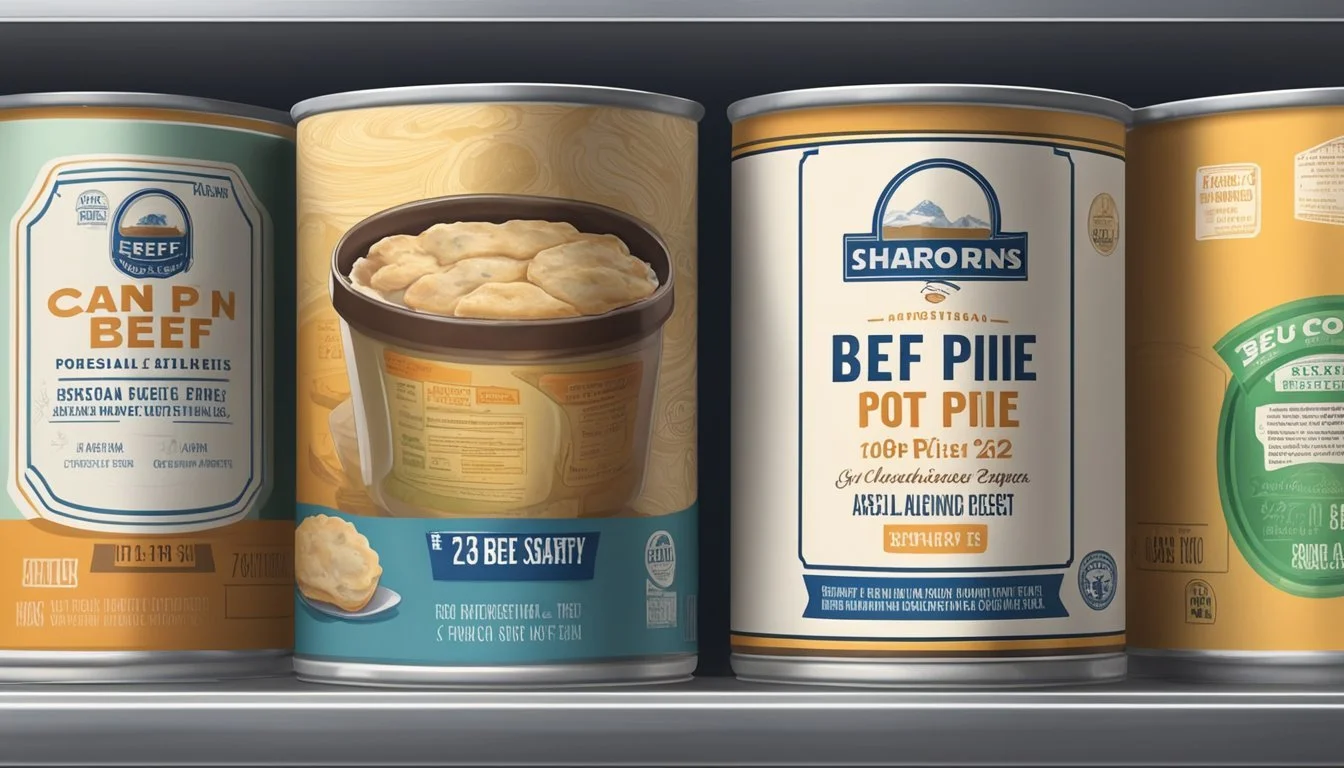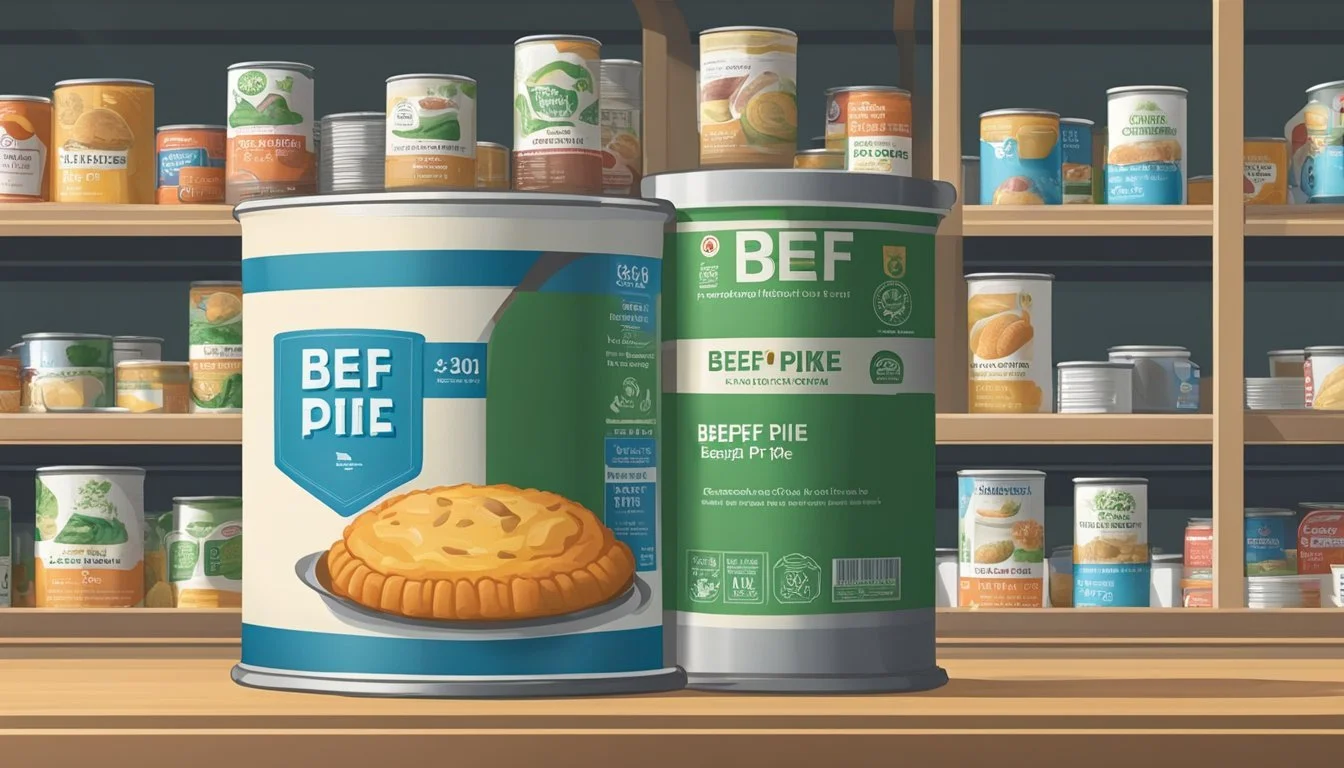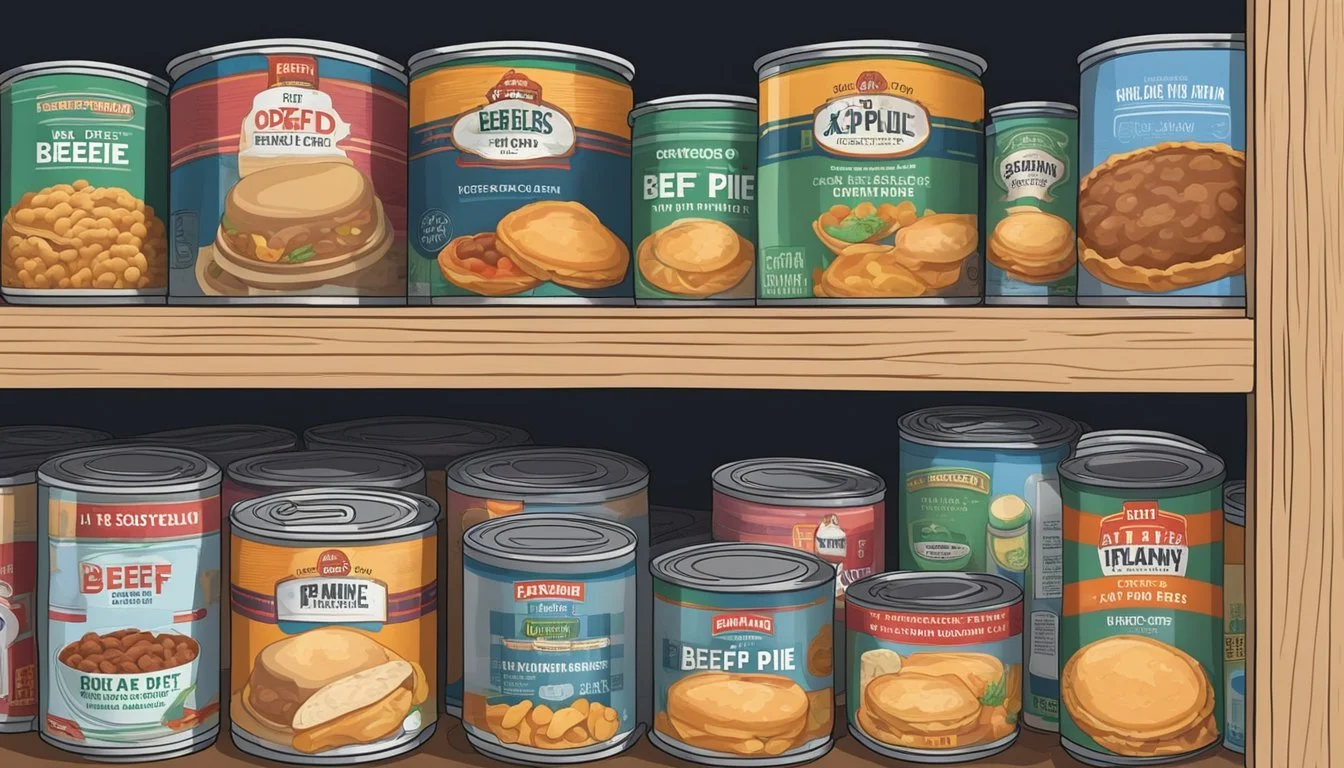Does Canned Beef Pot Pie Expire?
Shelf Life and Safety
Canned beef pot pie, like other low-acid canned goods, is known for its long shelf life. While the can may have a "best by" date, the contents can remain safe to consume well beyond this time if stored properly. Canned beef pot pie can last up to 5 years or more, provided the can is intact and shows no signs of spoilage.
A reader might question the safety and quality of such long-lasting products. It's essential to understand that while canned foods can remain safe for long periods, their taste and texture might degrade over time. However, ensuring the can is stored in a cool, dry place can help maintain its quality.
This guide will delve into the specifics of canned beef pot pies, including what to look out for regarding spoilage and how to maximize their shelf life. Understanding these factors can help make informed decisions about food safety and storage.
Understanding Canned Beef Pot Pie
Canned beef pot pie combines the convenience of canned foods with a hearty, flavorful meal. It typically includes beef, vegetables, and gravy encased in a pastry crust.
Canned goods like these are popular for their long shelf life. The process of canning preserves food by sealing it in airtight containers and heating it to kill harmful bacteria.
Ingredients generally found in canned beef pot pie include:
Beef: Provides protein and a rich taste.
Vegetables: Often includes peas, carrots, and potatoes.
Gravy: Adds moisture and enhances flavor.
Benefits of canned beef products:
Long Shelf Life: Canned foods can last for years when stored properly.
Convenience: Ready to eat with minimal preparation.
Consistency: Flavors and textures are preserved over time.
Storage Tips:
Cool, Dry Place: Store cans in a pantry away from direct sunlight.
Check Seals: Ensure cans are not bulging, rusted, or damaged.
Canned meats such as beef can be handy for quick meals. The best-by date on the can indicates optimal quality, but these products often remain safe to consume beyond that date if the can is intact.
Maintaining a supply of various canned foods can be beneficial, especially during emergencies when fresh food might not be available.
Expiration Date and Shelf Life
Understanding the expiration date and shelf life of canned beef pot pie is crucial for ensuring safety and quality. This section covers how to decode expiration dates and the various factors that affect shelf life.
Decoding Expiration Dates
Canned foods often display an expiration date to help consumers know how long the product will maintain its best quality. These dates are generally conservative and focus on peak quality rather than safety.
For canned beef pot pie, reading the expiration date can be straightforward. Look for phrases like "Best By," "Use By," or simply a date. While a past expiration date doesn't necessarily mean the canned food is unsafe, it may have diminished flavor, texture, and nutritional value.
Canned foods, including beef pot pie, are usually safe to eat well past these dates if stored properly. However, it's vital to inspect the can for any signs of spoilage, such as dents, rust, or leaks, as these could indicate compromised safety.
Factors Affecting Shelf Life
Several factors can influence the shelf life of canned beef pot pie. Storage conditions play a significant role. Keeping cans in a cool, dry place away from direct sunlight helps preserve their quality. Ideal storage temperatures are typically between 50°F to 70°F (10°C to 21°C).
The acidity level of the food also affects its shelf life. Low-acid foods, like meat and vegetables, tend to have a longer shelf life compared to high-acid foods like tomatoes or fruits. Canned beef pot pies, being low-acid, usually have a shelf life ranging from 2 to 5 years if stored properly.
Proper canning techniques are essential. Brands with stringent quality controls will provide products with more reliable shelf lives. Always refer to the manufacturer’s guidelines for the most accurate information.
Storage Best Practices
Proper storage of canned beef pot pie ensures it remains safe and tasty for a long time. It involves managing temperature, organizing your pantry, and taking steps to extend its shelf life.
Ideal Storage Conditions
Canning provides a long shelf life, but maintaining optimal storage conditions is crucial. Store canned beef pot pie in a cool, dry pantry with temperatures between 50-70°F (10-21°C). These conditions prevent heat damage and microbial growth.
Humidity can affect food quality. Ensure the storage area is dry to prevent rust on cans, which could lead to contamination. Regularly check for dents, bulges, or rust, as these can compromise the seal and safety of the contents.
Extending Shelf Life
To maximize the shelf life, use a first-in, first-out system. Label cans with the purchase date and organize them so older cans are used first. Although canned foods can last years, consuming them within 2-5 years ensures the best quality.
Avoid storing cans near heat sources or in direct sunlight, as elevated temperatures can degrade the food inside. If possible, place cans in a storage area with stable temperatures. Regularly inspect your storage space for any changes that might affect the cans, such as increased moisture or temperature fluctuations.
Taking these steps can ensure your canned beef pot pie remains safe and delicious for as long as possible.
Food Safety Concerns
When considering the expiration of canned beef pot pie, it's essential to understand the indicators of spoilage and the potential risks associated with consuming expired goods. Listed below are specific factors to watch for and the implications for food safety.
Identifying Spoilage
The first step in ensuring food safety is identifying any signs of spoilage in canned beef pot pie. A few key indicators can signal that the product is no longer safe to consume:
Bulging Cans: If the can appears swollen, it may contain harmful bacteria.
Leaking: Any evidence of liquid escaping from the can suggests contamination.
Dents and Rust: Physical damage can compromise the can's integrity, allowing bacteria to enter.
Bulging is particularly concerning as it may indicate the presence of Clostridium botulinum, the bacteria that causes botulism, a severe form of food poisoning.
Risks of Consuming Expired Goods
Consuming expired canned beef pot pie can pose several risks. The primary concern is the risk of bacterial contamination.
Botulism: This is the most significant risk, leading to paralysis and potentially death. It is often associated with bulging cans.
Other Bacteria: Pathogens such as Salmonella and E. coli can also be present in improperly stored or old canned foods.
Expired food might not taste or smell bad, but that doesn't mean it's safe. The USDA Food Safety and Inspection Service advises discarding any cans showing spoilage signs to prevent illness.
Remember: Safety should be a priority when dealing with canned goods.
Nutritional Considerations
Canned beef pot pie offers a convenient and shelf-stable option for meal preparation. However, it's important to evaluate the nutritional value over time and compare it with fresh produce to make informed dietary choices.
Nutritional Value Over Time
After canning, the nutritional value of beef pot pie remains largely stable for 2 to 5 years. Key nutrients such as protein, carbohydrates, and fats are well-preserved.
However, vitamins like vitamin C and certain B vitamins can degrade over time. It's crucial to store canned beef pot pie in a cool, dry place to maintain its freshness. The sodium content in canned foods generally tends to be higher to improve shelf life, which is a consideration for those monitoring salt intake.
Comparison with Fresh Produce
Canned beef pot pie includes vegetables like green beans and tomatoes, which have different nutritional profiles compared to their fresh counterparts. Fresh vegetables tend to retain more water-soluble vitamins, such as vitamin C. In contrast, the canning process can cause some nutrient loss but also makes the food shelf-stable for extended periods.
Table: Nutritional Comparison per 100g
Nutrient Canned Beef Pot Pie Fresh Green Beans Fresh Tomatoes Protein (g) 5 1.8 0.88 Vitamin C (mg) 3 12.2 13.7 Sodium (mg) 250 6 5
This table highlights that fresh produce often contains higher levels of certain vitamins but much less sodium compared to canned options.
When deciding between canned and fresh, consider the balance between convenience and nutritional content to meet dietary needs effectively.
Canned Food Quality Indicators
Freshness and safety of canned beef pot pie are primarily determined by evaluating the integrity of the can and observing specific quality indicators.
Can Integrity
The condition of the can plays a crucial role in determining the quality and safety of the food inside. Rusted cans or those with a compromised vacuum seal can lead to spoilage.
Appearance is also a key indicator. Deeply dented cans might indicate potential internal damage, which may affect the food's safety. While minor dents might be harmless, any dented cans should be inspected thoroughly.
Smell and appearance of the food inside are equally important. Upon opening, if the smell is off or the appearance is unusual, it is best to discard the product.
Proper storage conditions prolong the shelf life and maintain the quality of canned beef pot pie.
Practical Tips
Canned beef pot pie can remain safe to eat for a considerable period past its expiration date. By knowing how to utilize past-prime cans and understanding donation guidelines, you can minimize waste and ensure food safety.
Utilizing Past-Prime Cans
Canned beef pot pie can often be consumed past the printed date if stored properly. Always inspect the can for signs of damage or bulging before use. If the can appears intact, open it and check the contents for any unusual odors or discoloration.
Experts recommend incorporating the contents into thoroughly cooked recipes, which helps ensure any potential bacteria or spoilage organisms are destroyed. Parent-friendly recipes like casseroles and soups can make use of past-prime cans effectively. For example, adding the beef pot pie filling to a vegetable soup can be both convenient and safe.
Donation Guidelines
Donating past-prime canned goods is a thoughtful way to reduce waste, but some guidelines should be followed. Real Simple and other organizations assert that donated foods should be in good condition and free from any visible signs of spoilage. Most food banks accept canned items up to a year past their expiration date, but always check local regulations.
If donating isn't an option, consider sharing with parents who might appreciate the convenience. Always ensure the recipients are informed about the date and condition of the cans.
Proper storage, inspection, and thoughtful recipes help ensure safety and convenience, while sensible donation practices can make a positive community impact.
Regulatory and Expert Advice
Regulatory guidelines from the USDA and advice from food preservation experts play a critical role in determining the shelf-life and safety of canned beef pot pie. Understanding these perspectives helps ensure that the food remains safe to eat and retains quality for as long as possible.
USDA Recommendations
The USDA emphasizes that properly canned foods can last for several years if stored correctly. For canned beef pot pie, the storage area should maintain a temperature between 50-70°F (10-21°C). Low acid foods, like beef pot pie, have a shelf-life ranging from 2-5 years when canned and stored properly.
Cans should be free from rust, dents, and bulging to ensure food safety. The USDA advises consuming canned goods within two years for optimal quality, although they may remain safe beyond this period if there are no signs of spoilage.
Food Preservation Experts
Food preservation experts, such as those at Ball, recommend using a pressure canner for low acid foods to eliminate bacteria that can thrive in anaerobic conditions. Ensuring jars are sealed properly and stored in a cool, dark place is paramount. Labeling cans with the preparation date helps track their age and use them in order.
Experts agree that while canned beef pot pie can be safe indefinitely if stored correctly, quality may decline after extended periods. Regularly inspecting cans and rotating stock every 2-3 years helps maintain both safety and quality.
Specifics of Canned Meat Products
Canned meat products offer extended shelf life and convenience, making them a staple in many pantries. Key aspects of this preservation method include maintaining food quality and addressing unique concerns specific to meat cans.
Preservation of Meat Quality
Canned meats like beef stew, poultry, and spam benefit from the canning process, which involves sealing and heating to kill bacteria. Most low-acid canned foods, including meat, can last between two to five years when stored properly.
A stable temperature between 50-70°F (10-21°C) helps prevent heat damage and microbial growth. Good practices include labeling cans with dates and keeping an organized storage area. This way, older cans can be used first, ensuring quality meals.
Home-canned foods are slightly different. They need strict adherence to canning guidelines because improper techniques can lead to bacteria such as Clostridium botulinum, posing severe health risks. Monitoring these foods closely and storing them in optimal conditions is essential.
Unique Concerns with Meat Cans
Unlike high-acid foods that last around 18 months, canned meats can last several years. This longevity is due to their low acid content. Canned beef pot pie, for instance, can maintain its quality for a long period if kept in ideal conditions.
One must check for signs of spoilage such as bulging cans, foul smells, or unusual textures. These signs indicate possible contamination.
Canned meat provides a reliable food source even when fresh meat is in short supply. Stockpiling a variety of products ensures a balanced diet. Nevertheless, paying attention to storage practices and expiration dates is necessary to avoid any health hazards.
Home Canning Insights
Home canning offers an effective way to preserve food, ensuring that seasonal produce can be enjoyed year-round. This involves a detailed process that varies from commercial methods and requires careful attention to safety to prevent foodborne illnesses.
Home Canning vs Commercial Canning
Home canning typically involves sealing jars of food using heat to destroy microorganisms and deactivate enzymes. The pressure canner is essential for low-acid foods like meat, as it reaches higher temperatures needed to prevent the growth of the botulism toxin.
In contrast, commercial canning is performed in regulated environments, often with automated systems that ensure uniform quality and safety. Commercially canned goods undergo rigorous checks that might be challenging to replicate in a home setting.
While both methods aim to exclude oxygen and seal jars to preserve food, the canning process at home relies more heavily on manual techniques and user diligence. Consequently, home canning might have more variation in product shelf life compared to commercial canning.
Safety Checklist for Home Canners
Sanitize All Equipment: Ensure all canning jars, lids, and tools are thoroughly cleaned and sterilized.
Use a Pressure Canner: For low-acid foods like beef pot pie filling, a pressure canner is critical to achieve the necessary temperature.
Check Seals: Inspect the sealed jars to confirm they are airtight. Any broken or bulging seals can indicate spoilage.
Label Jars: Mark each jar with the canning date to track home canned foods and ensure they are used within recommended time frames.
Storage: Store in a cool, dark place, away from extreme temperatures, to maintain quality.
Inspect Before Use: Always examine the contents for signs of spoilage before consumption. This can include discoloration, off-odors, or unexpected bubbling.
Adhering strictly to these practices helps in keeping home canned goods safe and extends their shelf life effectively.










